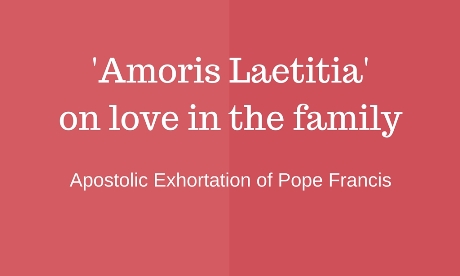In a new document, Pope Francis has called for renewed efforts to strengthen marriages, while being compassionate and close to people in their frailty.
The 325-paragraph document, Amoris Laetitia (The Joy of Love), draws together almost three years of consultation with Catholics around the world, including synods in 2014 and 2015.
Among the many topics addressed in the document, the Pope sets out a vision for how the Church should prepare people for marriage.
This will involve trained lay people, a “missionary conversion” of parishes to offer advice and guidance to couples, especially in the early years of their marriage, as well as changes to seminary formation and a host of other areas.
Elsewhere, Francis offered a frank criticism of what he sees as the Church’s failures to challenge young people to embrace marriage, taking refuge in dogmatism and abstraction and offering an “excessive idealisation” of marriage.
Francis criticised presentations of marriage in which its unitive meaning is overshadowed by ”an almost exclusive insistence on the duty of procreation”.
Writing of those who do not meet the ideal of Church teaching on marriage, the Pope wrote that “the degree of responsibility is not equal in all cases, the consequences or effects of a rule need not necessarily always be the same”.
“It can no longer simply be said that all those in any ‘irregular’ situation are living in a state of mortal sin and are deprived of sanctifying grace,” he wrote.
He emphasised the importance of personal and pastoral discernment.
Francis also wrote: “Because of forms of conditioning and mitigating factors, it is possible that in an objective situation of sin – which may not be subjectively culpable, or fully such – a person can be living in God’s grace, can love and can also grow in the life of grace and charity, while receiving the Church’s help to this end.”
In what is being seen as a noteworthy footnote (351) he stated that: “In certain cases, this can include the help of the sacraments.”
“Discernment must help to find possible ways of responding to God and growing in the midst of limits,” the Pope added in the next sentence in the main text.
Chapter 8 of the document, titled “Guiding, discerning, and integrating weakness”, has sections on the need for gradualness in pastoral care, the importance of discernment, norms and mitigating circumstances in pastoral discernment, and the “logic of pastoral mercy”.
But Pope Francis added: “To show understanding in the face of exceptional situations never implies dimming the light of the fuller ideal, or proposing less than what Jesus offers to the human being.”
“Today, more important than the pastoral care of failures is the pastoral effort to strengthen marriages and thus to prevent their breakdown.”
Sources
